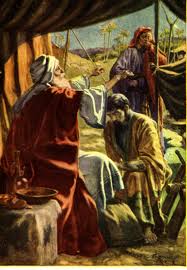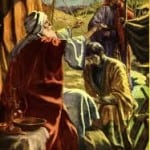moshe Kempinski
The Torah describes the following
“ It came to pass when Yitzchak (Isaac) was old, and his eyes were too dim to see, that he called Esav (Esau) his elder son, and he said to him, “My son,” and he said to him, “Here I am.”( Genesis 27:1)
The connection between the dimming of Yitzchak’s eyes and the calling out to his son Esav seems very clear.
Rashi gives three explanations regarding the blindness. The first is that Yitzchak’s eyes dimmed because they were blinded by the smoke of the incense offered by the wives of Esav worshipping their idols. The second explanation describes the ministering angels weeping upon seeing Yitzchak being bound up on the alter and their tears fell unto Yitzchak’s face and eyes. In time those tears dimmed his eyes. The third explanation is that this was Hashem’s way of enabling Yaacov ( Jacob) to receive the blessings.
In truth all of these explanations are interconnected. After the experience of the Akeida ( the binding of Yitzchak on Mount Moriah) Yitzchak was forever changed. We see that as opposed as to the time wherein Abrahamn and his son approached Mount Moriah together, they leave separately. We read ” So Abraham returned unto his young men, and they rose up and went together to Beer-Sheba; and Abraham dwelt at Beer-Sheba(ibid 22:19).
Abraham returned alone while Yitzchak stayed back to absorb ,understand and grow from the experience. Yitzchak is traditionally identified with the divine attribute of Gevurah or “Might” .This Might is not a description of physical strength and power but rather it relates to the ability to withhold one’s personal passions and fears in the face of great challenge.
As Ben Zoma declares in Pirkei Avot( ethics of the Fathers) “Who is mighty? One who conquers their impulse to evil, as it is written, “One who is slow to anger is better than the mighty, and one who rules over their spirit than one who conquers a city” (Proverbs 16:32)”. Yitzchak’s experience on Mount Moriah was the greatest lesson and test of that attribute.
Following this ,it was hard for Yitzchak to see anything less in those around him. He could not countenance the idolatry of Esav’s wives and he could not totally accept Esav’s failures. Yitzchak believed that the role of this great nation was to become a great people that will impact and change the world. Yitzchak also believed that though Esav may be a rogue at this time he would soon repent and do tshuva .At that point he would be a great, righteous and powerful force in the world .Yitzchak felt that in order to vanquish evil one would need strength and cunning . He was concerned that Yaacov would not have the daring to forge forward to victory on his own. Yaacov with all his attributes was a essentially “was a quiet man, dwelling in tents.”
So Yitzchak was blinded to the evil traits of his son and believed that Esav and his character completed Yaacov and his traits.That would explain the depth of his receiving twin sons. Rivka, on the other hand, with the feminine attribute of Bina Yiteira -Female spiritual intuition understood that Esav’s rootedness in power and instant gratification could not be helpful in achieving G-d’s plan. She knew what G-d had told her earlier;
And HaShem said unto her: Two nations are in thy womb, and two peoples shall be separated from thy bowels; and the one people shall be stronger than the other people; and the elder shall serve the younger. (Breishit 25:23).
I thought of this spiritual an pure “impaired vision” as I participated in a very painful and futile demonstration outside the walls of the Ofer prison. When the call came out to come gather at the prison to protest the releasing of more Palestinian murders and terrorists at the behest of the American president ,my wife and I drove silently to the demonstration. When we got there and parked our car by the 443 highway, we saw many others walking slowly and silently towards the demonstration. People hardly acknowledged each other and there was a heavy sense of shame and sadness.
One sign hand drawn by some young people tore out my heart. It said ” it is easier to say no to Obama then it is to say Kaddish foir our loved ones.” So tragically simple and true yet the blindness seemed overwhelming.
I wondered if this insane decision by the Israeli government was a result of the same type of blindness as that of our forefather Yitzchak. Is it possible that they truly saw the hope of goodness in the other side? I realized that that was not the case. Their blindness was not born of their inability to see evil for what it is. It came out if their inability to see the value and truth of their own position and values. They were stricken with the blindness of the sin of the spies;
” And we were in our own sight as grasshoppers, and so we were in their sight.”( numbers 13:33).
May we all see the overcoming of that blindness very soon
LeRefuat Yehudit bat Golda Yocheved


Moshe, Thank you so much for your comments today. I accessed them on the Arutz Sheva column. I too share your assessment of the gathering blindness of both of our governments. I mourn with you for the loss of precious lives and the seemingly mindless decision to release the perpetrators. What appears on the part of a misguided few to be an expedient decision in the moment always has a price tag to be paid in greater losses down the road. There is no wisdom in such choices. My amazement at such things has turned to shame and anger. Thank you for your voice of dissent. You are being heard and understood.